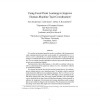Free Online Productivity Tools
i2Speak
i2Symbol
i2OCR
iTex2Img
iWeb2Print
iWeb2Shot
i2Type
iPdf2Split
iPdf2Merge
i2Bopomofo
i2Arabic
i2Style
i2Image
i2PDF
iLatex2Rtf
Sci2ools
AAMAS
2011
Springer
2011
Springer
Using focal point learning to improve human-machine tacit coordination
We consider an automated agent that needs to coordinate with a human partner when communication between them is not possible or is undesirable (tacit coordination games). Specifically, we examine situations where an agent and human attempt to coordinate their choices among several alternatives with equivalent utilities. We use machine learning algorithms to help the agent predict human choices in these tacit coordination domains. Experiments have shown that humans are often able to coordinate with one another in communication-free games, by using focal points, “prominent” solutions to coordination problems. We integrate focal point rules into the machine learning process, by transforming raw domain data into a new hypothesis space. We present extensive empirical results from three different tacit coordination domains. The Focal Point Learning approach results in classifiers with a 40% to 80% higher correct classification rate, and shorter training time, than when using regular ...
| Added | 12 May 2011 |
| Updated | 12 May 2011 |
| Type | Journal |
| Year | 2011 |
| Where | AAMAS |
| Authors | Inon Zuckerman, Sarit Kraus, Jeffrey S. Rosenschein |
Comments (0)

